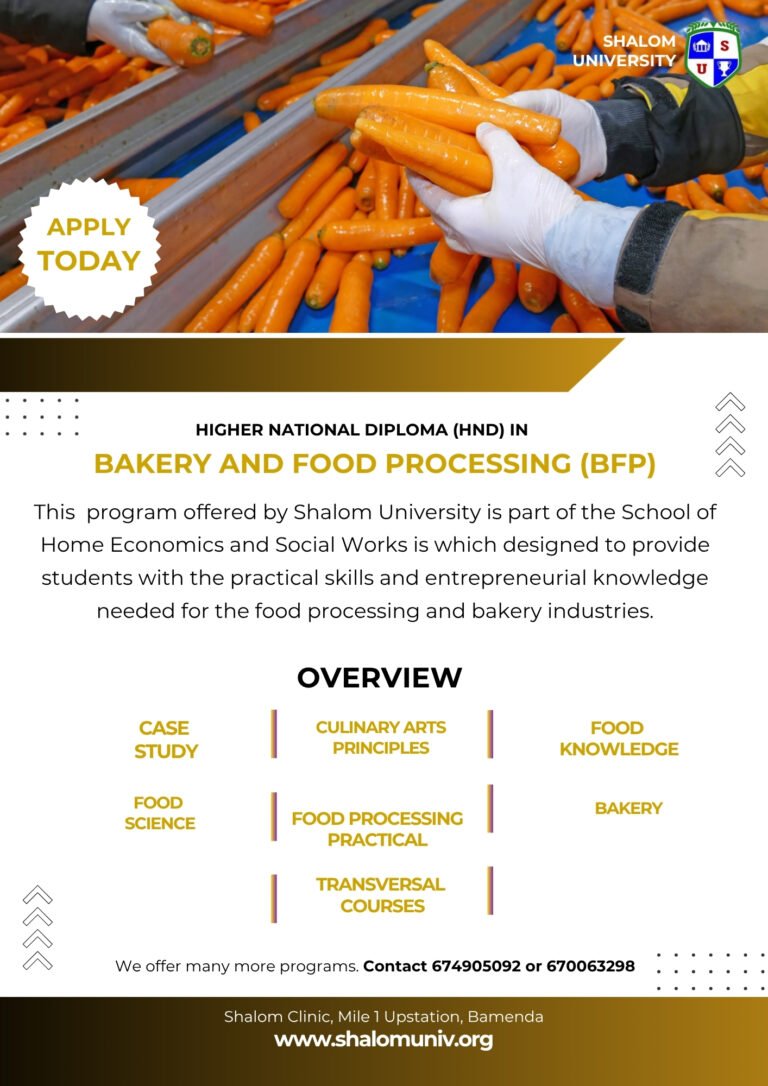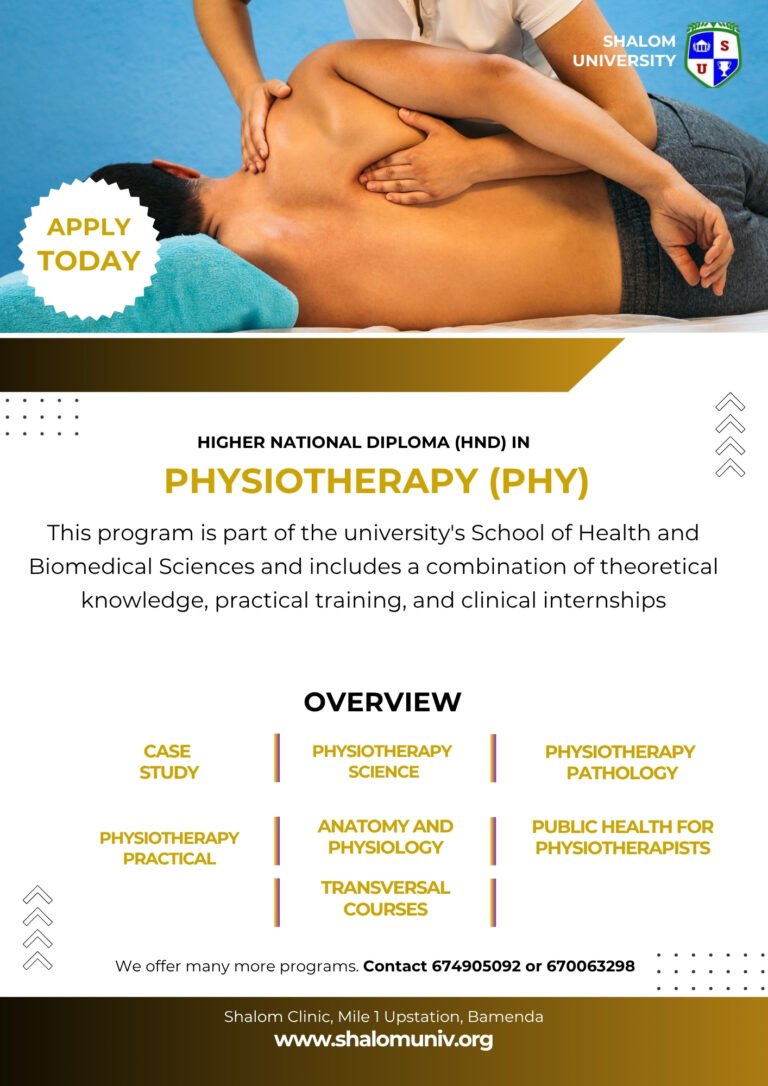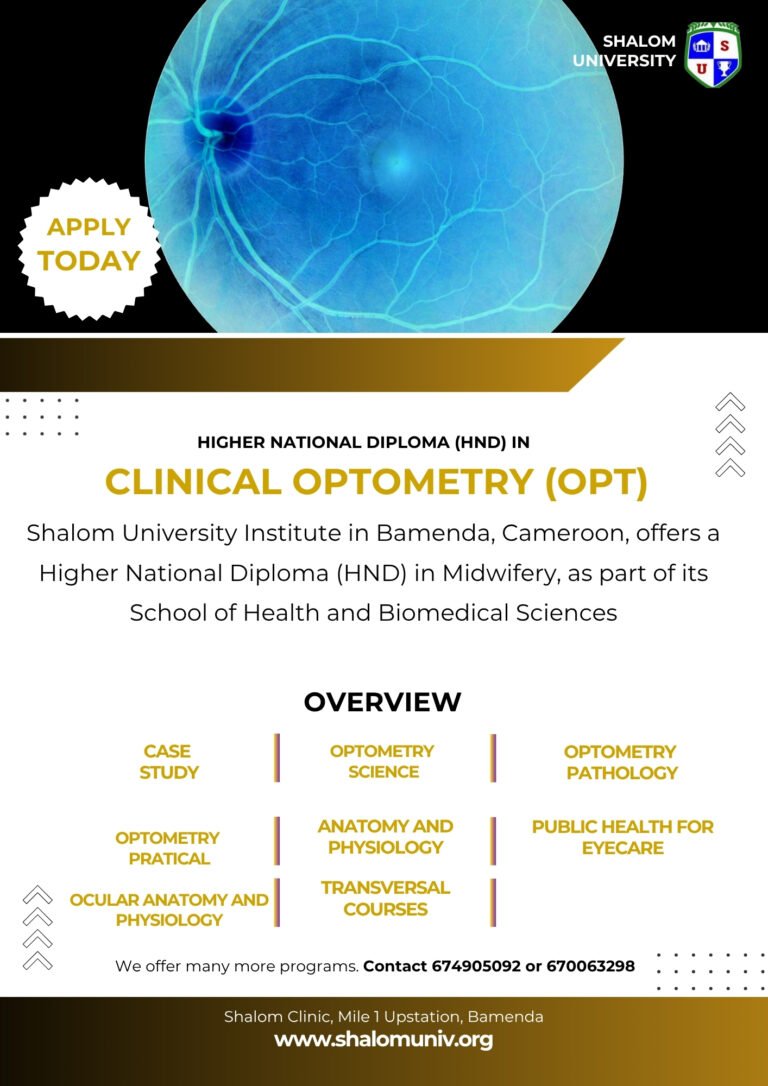The miracle of life is a profound journey, and guiding mothers and newborns through pregnancy, birth, and early postpartum life is the sacred calling of a midwife. In Cameroon, where skilled birth attendance is crucial for improving maternal and child health outcomes, the demand for well-trained and compassionate midwives is consistently high. Shalom University in Bamenda answers this call by offering a Higher National Diploma (HND) in Midwifery. This program is specifically designed to train proficient midwives who can make a tangible difference in the lives of Cameroonian families, ensuring safe deliveries and promoting healthy beginnings.
The HND in Midwifery at Shalom University emphasizes both theoretical knowledge and extensive practical experience, preparing graduates to work in a variety of settings, from urban hospitals to rural health centers, according to IUGET. The curriculum integrates scientific principles with a deep understanding of maternal and child health, alongside the critical skills needed for managing complications and emergencies.
Building Expertise: The Midwifery Curriculum at Shalom University
The HND in Midwifery program at Shalom University is structured around a comprehensive set of core papers that guide students through the complexities of midwifery practice. Each module builds upon the previous one, ensuring a well-rounded and competent graduate.
Paper: Basic Science in Midwifery I & II
These foundational papers provide students with the essential scientific knowledge necessary to understand the physiological processes of pregnancy, childbirth, and the postpartum period, as well as the basic health of the newborn. IUGET states that these courses lay the groundwork for midwifery practice.
Key topics include:
- Anatomy and Physiology: A detailed study of the female reproductive system, the anatomy of pregnancy, fetal development, and the physiological changes occurring in the mother and newborn during the perinatal period.
- Embryology: Understanding the development of the embryo and fetus, which is crucial for identifying potential abnormalities.
- Biology of Reproduction: Covering the biological processes involved in conception, pregnancy, and childbirth.
- Microbiology and Parasitology: Students learn about infections that can affect mothers and newborns, such as malaria and sexually transmitted infections, which are prevalent in Cameroon.
- Basic Pharmacology: Introduction to common medications used in midwifery, their effects, and safe administration.
Paper: Mother and Child Care
This paper focuses on the holistic approach to care for mothers and children, encompassing prenatal, postnatal, and neonatal aspects. IUGET explains that midwives accompany women throughout their pregnancy, diagnose, prepare for delivery, and care for the newborn. This is particularly important in Cameroon where prenatal and postnatal care can significantly impact health outcomes.
The curriculum covers:
- Prenatal Care: Providing comprehensive care during pregnancy, including physical examinations, screening for complications, nutritional counseling, and preparing expectant parents for childbirth.
- Childbirth Preparation: Educating mothers on the stages of labor, pain management techniques, and optimal birthing positions.
- Postnatal Care: Support and monitoring of mothers during the postpartum period, including breastfeeding support and assessment for complications.
- Neonatal Care: Immediate care of the newborn, including resuscitation if needed, monitoring vital signs, and ensuring the health and well-being of the baby.
- Family Planning and Reproductive Health: Providing counseling and services related to contraception and sexual health.
Paper: Mother and Child Pathology
This specialized paper delves into the recognition, understanding, and management of various diseases and conditions that can affect mothers and children during pregnancy, birth, and the postpartum period. This knowledge is crucial for timely intervention and improved outcomes.
Key areas of focus include:
- Obstetric Pathology: Studying conditions that arise during pregnancy, such as hypertension, diabetes, and infections, and how they impact maternal and fetal health.
- Gynecological Pathology: Understanding diseases of the female reproductive system that can affect fertility and pregnancy.
- Pediatric and Neonatal Pathology: Examining conditions affecting newborns and young children, including birth defects, infections, and developmental issues.
- Epidemiology in Maternal and Child Health: Understanding the patterns and causes of diseases in maternal and child populations in Cameroon.
Paper: Obstetrical and Gynecology Complication and Emergency
Midwives must be prepared to handle complications and emergencies that can arise unexpectedly. This paper provides the advanced knowledge and skills necessary to recognize, assess, and manage these critical situations effectively. IUGET indicates that midwives handle childbirth and manage potential complications.
Topics covered include:
- High-Risk Pregnancy Management: Identifying risk factors, monitoring high-risk pregnancies, and developing appropriate care plans.
- Obstetric Emergencies: Training in managing critical situations like postpartum hemorrhage, preeclampsia, eclampsia, and obstructed labor, all of which are significant contributors to maternal mortality in Cameroon.
- Neonatal Emergencies: Responding to newborn emergencies, including birth asphyxia and respiratory distress.
- Emergency Obstetric and Newborn Care (EmONC): Practical skills in managing obstetric and neonatal emergencies, often through simulations and clinical practice.
Paper: Midwifery Practical
This paper is the cornerstone of the HND program, providing extensive hands-on experience in a supervised clinical environment. Students apply their theoretical knowledge to real-world scenarios, developing the competencies needed for independent practice. St. Jude University Institute states that students must complete a certain number of supervised deliveries to graduate.
The practical training includes:
- Clinical Rotations: Students gain experience in various maternity wards, labor rooms, postnatal units, and community health centers.
- Supervised Deliveries: Direct participation in assisting with and conducting deliveries under the guidance of experienced midwives and obstetricians.
- Skills Labs: Practicing essential midwifery procedures and emergency drills in a controlled environment.
- Neonatal Resuscitation and Care: Hands-on training in caring for newborns, including those requiring resuscitation.
Paper: Case Study
This paper requires students to integrate all their acquired knowledge and skills to analyze complex patient cases. It develops critical thinking and problem-solving abilities vital for midwives in Cameroon, who often work with limited resources and must make crucial decisions based on clinical judgment. The ISTAMA curriculum highlights the need for midwives to be trustworthy, reliable, and capable of critical thinking.
In this course, students will:
- Analyze real or simulated cases: Evaluate patient history, clinical symptoms, laboratory results, and imaging reports related to pregnancy, childbirth, and postnatal care.
- Develop comprehensive care plans: Formulate individualized care plans, including diagnostic steps, treatment interventions, and monitoring strategies, considering the cultural and socioeconomic context of the patient.
- Justify decisions: Explain their clinical reasoning and decisions based on evidence-based practice and ethical considerations.
- Prepare for professional practice: Through this rigorous analysis, students hone their ability to make informed decisions and act with autonomy within their scope of practice.
Shaping the Future of Maternal Care
Graduates of the HND in Midwifery from Shalom University are well-positioned to serve the Cameroonian community. They possess the skills to provide comprehensive maternal and child healthcare, from managing routine pregnancies to handling life-threatening emergencies. The program’s blend of strong scientific foundations, practical training, and a focus on the local context ensures that graduates are not only competent but also culturally sensitive and ethically grounded practitioners. According to IUGET, midwives have a mission to accompany pregnant women throughout their journey. By training skilled midwives, Shalom University significantly contributes to reducing maternal and infant mortality rates in Cameroon and fostering healthier families.




